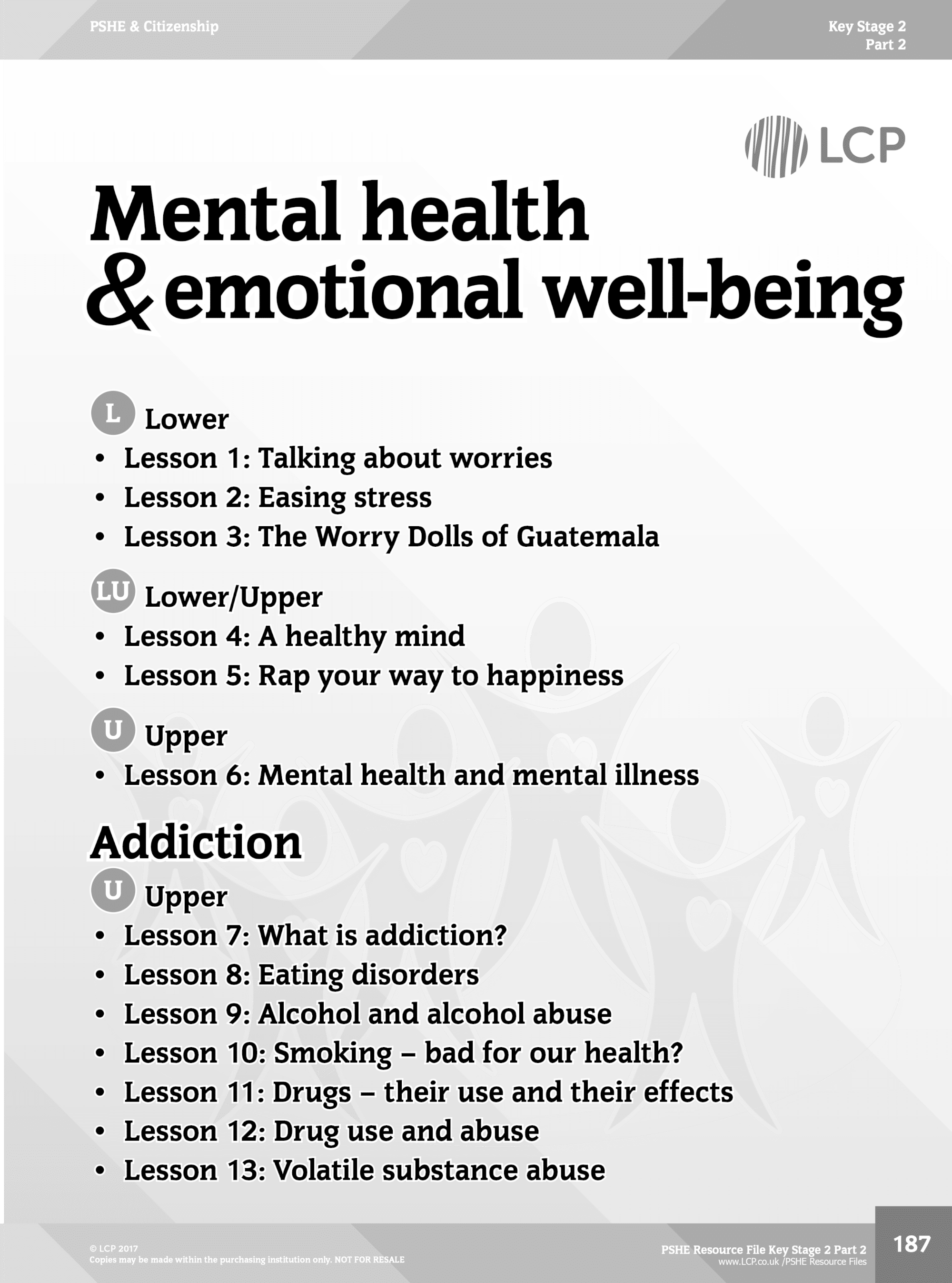- Unit 4 Mental And Emotional Health Disorders
- Unit 2 Mental And Emotional Health
- Unit 1 Mental And Emotional Health
- Mental And Emotional Health
- P a g e 4 Unit Rationale In the United States, approximately 6 to 9 million children and adolescents have serious emotional disturbances.1 Research shows that one of five children and adolescents aged 9 to 17 years experience symptoms of mental health problems that cause some level of.
- Mental and Emotional health (unit 3) STUDY. Chapters 7,8, and 9 study guide. Terms in this set (36) Mental and emotional health. The ability to accept yourself and others, adapt to and manage emotions and deal with the demands and challenges you meet in life.
Emotional health, a concept synonymous with wellbeing, is vital to living a life of wholeness, balance, and contentment. Simply put, an emotional health definition is one that includes resilience - getting up when life knocks you down. Rather than living a problem-free life (quite impossible if you're a human being), emotional health means that one can bounce back from setbacks and thrive despite problems.
Health Unit 2 ATOD Unit 3 Consumer Health Relationships Unit 4 Nutrition Yoga Novice Group Fitness Men's Tennis Relationships Unit 4 Nutrition SQUASH INFORMATION Unit 1 Mental and Emotional Health Optimal mental wellness is a balance of the five components of Health and Wellness. Lettertotheteacher.ppt: File Size: 172 kb: File Type: ppt.
Sometimes, when people discuss mental health, they are referring to the concepts of emotional health and wellbeing. Indeed, the terms mental health and emotional health can be used interchangeably. However, many times there is a difference between the two. The definition of mental health typically refers a state of being, related to the brain/mind and thoughts, feelings, and behaviors, that exists on a spectrum from optimal functioning to debilitating mental illness (List of Mental Illnesses). Emotional health, in contrast, refers to wellbeing and the way someone views, and lives, a life of wellness.
Definition of Emotional Health

Emotional health is a state of positive psychological functioning. It can be thought of as an extension of mental health; it's the 'optimal functioning' end of the thoughts, feelings, and behaviors that make up both our inner and outer worlds. It includes an overall experience of wellness in what we think, feel, and do through both the highs and lows of life.
In a successful attempt to provide a definition of emotional health, the organization BelongTo.org (n.d.) quotes the Mental Health Foundation: emotional health is 'a positive state of wellbeing which enables an individual to be able to function in society and meet the demands of everyday life.'
How To Improve Emotional Health
Improving emotional health is similar to improving physical health. It transcends the notion of mere freedom from illness to involve actively feeling well and living well.
Emotional health and wellbeing involve defining and creating your own life worth living, a concept that comes to us largely from the field of positive psychology.
An important step in creating emotional health is to identify your own emotions and to understand their value. All emotions have meaning and value simply because they're part of us. That doesn't mean they are all good for us to experience long-term, however. We don't have to sit back and let feelings overwhelm us.
Instead, we can develop emotional intelligence, the ability to identify emotions and use them constructively. This leads to learning emotional regulation, or the ability to control emotions, monitoring them and adjusting our mindset and behavior accordingly.
Unit 4 Mental And Emotional Health Disorders
Achieving emotional health and wellbeing is an active process that involves not only identifying emotions but also shaping how we think about them and how we act (or refrain from acting) on them. Some tips for creating your own emotional health definition and living it include:
Unit 2 Mental And Emotional Health
- Identifying personal strengths, building them, and living from them
- Learning optimism, realistically seeing the positive in even bad situations
- Developing the courage to define, and then live, your life worth living
- Honing resiliency, the ability to learn from and bounce back from setbacks as well as flexibility in facing challenges
- Seeing the good in yourself and developing a healthy self-concept
- Building a social network, even if it's small
- Creating a set of coping skills for dealing with mental health difficulties and external stress
- Living life with a sense of purpose
- Honoring your sense of creativity in your hobbies and leisure time
Benefits of Emotional Health
Emotional health takes work. It involves attending to and fine-tuning thoughts, feelings, and behaviors. The benefits of creating and maintaining wellbeing, though, are well worth the effort. Defining and living your emotional health leads to positive change and personal growth, a healthy sense of self-confidence, a peaceful sense of healing and recovery from mental health challenges, and a sense of hope.
Unit 1 Mental And Emotional Health
Whether one uses the term emotional health or mental health isn't important. What is important is knowing what this wellness means to you and using the knowledge to shape your healthy life. A workable definition of emotional health as a life concept is a state of wellbeing, resilience, and recovery from mental health problems and/or stress that leads to a life worth living.
Mental And Emotional Health
APA Reference
Peterson, T. (2019, October 13). What Is Emotional Health? And How To Improve it?, HealthyPlace. Retrieved on 2021, January 20 from https://www.healthyplace.com/other-info/mental-illness-overview/what-is-emotional-health-and-how-to-improve-it
